| Srl | Item |
| 1 |
ID:
071716
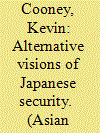

|
|
|
|
|
| Publication |
2005.
|
| Summary/Abstract |
In the post-cold war world Japanese security policy has grasped at nationalistic elements within Japanese society in attempts to "securitize" itself by means of a foreign policy independent of the United States. The role of absolute and relative gains in the making of Japanese foreign and security policy will be examined in light of alternative security issues. Working from International Security: A New Framework for Analysis by Barry Buzan et al., this article will examine Japanese security policy in light of Japan's attempts to securitize itself in non-traditional ways that impact traditional security.
|
|
|
|
|
|
|
|
|
|
|
|
|
|
|
|
| 2 |
ID:
096966
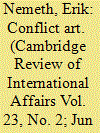

|
|
|
|
|
| Publication |
2010.
|
| Summary/Abstract |
Historically, empires recruited scholars to capture artworks as a complement to military victory. Over the past century, cultural scholars have integrated fine art and antiquities into campaigns of conquest and assessed the political ramifications of damage to historic sites and religious monuments in military intervention. Consequently, historians, archaeologists and legal scholars have advanced the role of cultural patrimony in international conflict from a rite of conquest to a means of combat. In World War II, art historians in the Nazi regime planned plunder of artworks and destruction of historic structures as a tactic for conquest. During the Cold War, archaeological discoveries in developing nations enabled looting of cultural artifacts, and subsequent legal studies on the transfer of cultural property developed the value of cultural patrimony in the covert battle for control of the Third World. Since the Cold War, as transnational organized crime and terrorism exploit antiquities trafficking and target cultural sites in acts of political violence, scholars in international relations have considered culture in security theories. Across the three periods of international conflict, cultural scholars have actively developed the tactical value of cultural patrimony and played a role in transforming the perception of plunder in the context of military victory.
|
|
|
|
|
|
|
|
|
|
|
|
|
|
|
|
| 3 |
ID:
182598
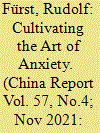

|
|
|
|
|
| Summary/Abstract |
Deepening globalisation and worldwide availability of free information and ideas raise concerns of the communist China’s political leadership about the stability of the regime and the sustainability of the state ideological orthodoxy. Therefore, the state’s tightening control of the public communication to curtail the domestic criticism and occasional public discontent is becoming framed and legitimised in terms of cultural security as a non-traditional security concern. This study argues that the restrictive impacts of the politicisation of culture in the centralised agenda of President Xi Jinping reinvigorate China’s anti-Western narratives and attitudes. The research focuses on the state’s cultural security-related and applicable strategy in the political and institutional agenda and media. Moreover, the study also traces the state cultural security policy in the field of the civic and non-governmental sector, religious and ethnic minorities policy, literature, film and audiovisual sectors. The findings assess the concern that the intellectually anachronistic, self-restraining and internationally hostile policy devaluates China’s cultural potential and complexity.
|
|
|
|
|
|
|
|
|
|
|
|
|
|
|
|
| 4 |
ID:
175159
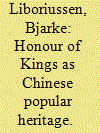

|
|
|
|
|
| Summary/Abstract |
This article examines how users on social media responded to state criticism of the representation of Chinese historical characters in the popular Tencent mobile game Honour of Kings. The game’s usage of historical characters and the ensuing debate and criticism are analysed as ‘popular heritage’. A qualitative content analysis identifies several categories in the discussion of this game on the Q & A website Zhihu (知乎). The article discusses these categories in relation to existing literature on popular heritage. The analysis contributes to this literature by identifying a new feature of popular heritage, whereby the dissonance associated with popular heritage becomes in itself an enjoyable object of popular pleasure, deepening popular heritage’s capacity to generate critique of authorized heritage and exposing divisions within the power bloc. In light of these findings, we call for an approach to popular heritage that escapes a dichotomous people–elite schema in favour of a multi-actor approach.
|
|
|
|
|
|
|
|
|
|
|
|
|
|
|
|
| 5 |
ID:
127286
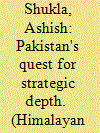

|
|
|
| 6 |
ID:
113409
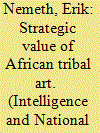

|
|
|
|
|
| Publication |
2012.
|
| Summary/Abstract |
Military engagement of insurgents risks destruction of religious monuments and historic structures, and political and economic instability that follows armed conflict enables looting of antiquities. In combination, threats to cultural structures and movable cultural patrimony compromise cultural security. This article explores the potential of the art market for open-source intelligence assessments of cultural security. A comparison of the market value of artifacts of different ethnic origins provides a measure of the risk of looting of cultural patrimony by geographic region. Intelligence assessments of the relative desirability of cultural artifacts by region of origin can inform strategic planning to mitigate looting in conflict zones and to alert security services to emerging threats of trafficking in cultural patrimony.
|
|
|
|
|
|
|
|
|
|
|
|
|
|
|
|
| 7 |
ID:
168834
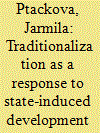

|
|
|
|
|
| Summary/Abstract |
The current state-induced and top-down-implemented development and modernization of the predominantly rural areas of western China can be perceived as a clear demonstration of Chinese power in Tibetan areas, resulting in the repression of expressions of minority culture. This article argues that the local population’s various practices of traditionalization, as demonstrated through an emphasis on the maintenance or (re)invention of representative cultural forms can be understood as efforts to counteract the socio-economic and cultural assimilation measures or even as a form of political resistance. At the same time, in the context of the economic opportunities brought on by the rapid development, in tourism for example, traditionalization has become an important economic asset for both the state and local Tibetans. These (revived) traditions could enhance cultural awareness among visitors to minority areas and strengthen local people’s sense of cultural security and their self-understanding as Tibetans.
|
|
|
|
|
|
|
|
|
|
|
|
|
|
|
|